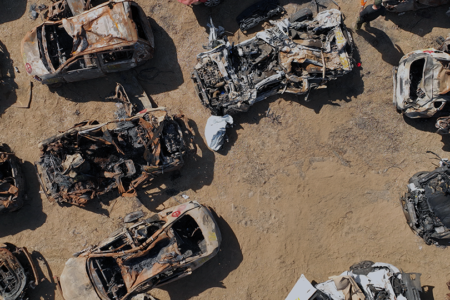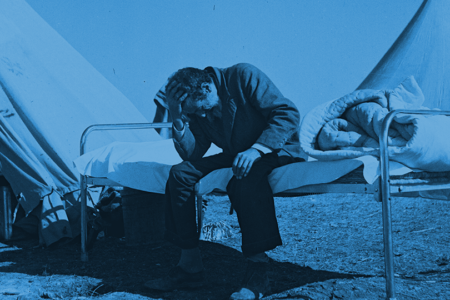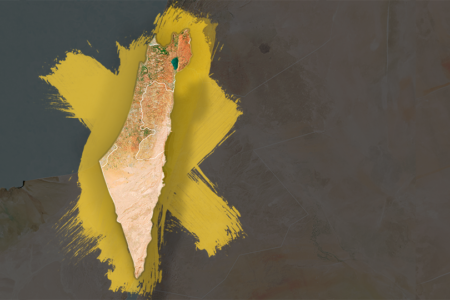Seven Minutes with The International Director Aug/Sep 1979
If I had been asked to write the epitaph of Moses, I would have written something like this: “Moses, God’s lawgiver, is dead,”’ or “Moses, God’s miracle-worker, is dead,” or “Moses, God’s statesman, is dead,” or “Moses, God’s judge over Israel, is dead.” But when God himself wrote the epitaph of Moses, He said: “Moses my servant is dead . . . “(Josh.1:2). God was interviewing Joshua to see if he wanted the job left open by the death of Moses. God wanted Joshua to understand that He was looking for a man with one special quality, the ability to be a servant. No less than five times in Joshua, chapter one. God refers to Moses as a servant:
“Now after the death of Moses the servant of the Lord . . . ” (Josh, 1:1).
“Moses my servant is dead …” (Josh. 1:2).
“Only be thou strong and very courageous, that thou mayest observe to do according to all the law, which Moses my servant commanded thee . . . ” (Josh.1:7).
“Remember the word which Moses the servant of the Lord commanded you … ” (Josh. 1:13).
” … then ye shall return unto the land of your possession, and enjoy it, which Moses the Lord’s servant gave you on this side of the Jordan . .. ” (Josh. 1:15).
Is it any wonder, therefore, that the New Testament sums up the life of Moses in these few words: “And Moses verily was faithful in all his house, as a servant . . . “ (Heb.3:5).
God’s words to Joshua were not in vain -~ the General got the message. At the end of his life he summoned the leaders of Israel together and gave them this needfuL admonition (needful because many of the people were beginning to worship the heathen gods of the land to which Jehovah had brought them): “… choose you this day whom ye wilL serve . . . but as for me and my house, we shall serve the Lord” (Josh. 24:15).
The point to be made is critical — God is not looking for great evangelists, or preachers, or teachers, or businessmen, or housewives or carpenters. He’s looking for men and women who will make great servants — whose lives will be clay in the Potter’s hands, Moses was such a man, and God fashioned him for His own purposes.
Moses At The Burning Bush – His Call Into The MInistry
The forty years Moses spent on the backside of the desert had not been wasted years. Invaluable lessons had been learned. Moses needed the weary discipline of those quiet years before he could obey the high vocation and ministry to which God was now calling him. God’s commission to this servant did not come quietly in the still of the night but in a dramatic spectacle. The lesson it taught never diminished during the forty years of wilderness wanderings. The spectacle Moses beheld was a bush that burned and was not consumed.
The sanctity of the occasion was startling — out of the midst of the bush came the voice of God: “… Moses, Moses,. , . put off thy shoes from off thy feet, for the place whereon thou standest is holy ground” (Ex. 3:4-5).
The burning bush which Moses beheld needed no hot flame to reduce it quickly into a heap of white ashes. In all probability the region was arid and dry; the bush scorched and withered; its leaves dead and limp; its branches dry and sapless. The lapping flames should have made speedy work of such a bush, but the thorn was not consumed, No branch, twig or leaf was even scorched or singed. One need not, therefore, wonder why Moses said, “I will now turn aside, and see this great sight . . . ” (Ex. 3:3). The visual object lesson was clear and concise. Though every normal indication argued for the annihilation of the thorn bush, it was miraculously preserved.
At that same moment the Hebrew race was enslaved down in Egypt; ‘stunted’ because of depravations; ‘thorny’, with no apparent value; in the crucible of ‘fiery’ affliction. Every normal indication argued for extinction — but like the thorn bush, that people would be miraculously preserved. And like the thorn bush, Jehovah will one day speak from out of the midst of her.
How perfect the timing of this revelation. The Hebrews had not yet become a nation –that would happen later, at Mt. Sinai. But at the outset, it was essential that Moses understand three basic facts: Firstly, the people to whom God was sending him would be submitted to the fiery flames of affliction; secondly, the Hebrews would be miraculously preserved; thirdly, God would speak out of the midst of that nation to the peoples of the world.
Moses was reticent to respond to the call of God for such a monumental task. He questioned, “… Who am I, that I should go unto Pharaoh, and that I should bring forth the children of Israel out of Egypt?” (Ex. 3:11).
To this objection. God had to reprimand Moses by saying, “… I will be with thee;… I have sent thee. ..” (Ex. 3:12). Moses was to be a servant.
Moses In The Court Of Pharaoh – His Clash With Heathenism
As important to God as the work a man does is the man who does the work. It was only when Moses was prepared and equipped that God sent him to Egypt to redeem His covenant people.
To enslaved Israel Moses would say, “The God of your fathers has sent me unto you.” His name is “I am that I am” — a name implying that He is the self-existent One who can become whatever His children have need of. This was a marked departure from the Egyptian worship of more than eighty gods whose spheres of influence were, by their own admission, severely restricted. Among their deities, Khnum was the god of the river’s (Nile) source; Hapi and Hegt were frog goddesses related to fertility; Seb was the earth god; Uatchit was the fly god; Serapia was the god who protected from the locusts. Egypt had gods associated with bulls and cows; gods for healing; moon gods; agricultural gods; and even Pharaoh himself was worshipped as a god. Into that environment, Moses went to bring the children of Israel -forth to worship the ONE TRUE AND LIVING GOD.
For Pharaoh of Egypt, Moses also had a word to speak: “… Thus saith the Lord God of Israel, Let my people go . . . ” (Ex. 5:1). On four more occasions God would tell His servant to make the same pronouncement in the presence of Pharaoh: “Let my people go!” “Let my people go!” “Let my people go!” “Let my people go” (Ex, 8:1, 20; 9:1, 13). It wasn’t only what Moses said, but it was the way he said it — the inflection in his voice. No timidity here — this was not a request but a command. “Let my people go!” The gauntlet of challenge was thrown down. The contest was not between Moses and Aaron on the one side and Pharaoh and his advisors on the other. No, this was a contest between the God of Israel and the gods of Egypt. Each of the plagues resulted in the dethroning of another Egyptian deity, until, with the death of the firstborn where the blood was not applied (including the son of Pharaoh), all of the Egyptian deities came tumbling down.
Having defeated the polytheism of Egypt, the first thing God said to the Jewish people at Mount Sinai was, “Thou shalt have no other gods before me” (Ex. 20:3).
Moses At The Red Sea – His Courage In Adversity
Caravans leaving Egypt and heading eastward would take one of three possible roads. The most direct route to Canaan was the Via Maris, the way of the sea . A second route was “the way of Shur” which crossed the Sinai peninsula to southern Canaan and connected with the route going north through Beersheba and Hebron to Jerusalem. The third route ran across the peninsula from the Gulf of Suez to Ezion- Geber located at the head of the Gulf of Aqaba.
Moses chose none of those routes. They were all filled with danger for the “mixed multitude” he was leading out of Egypt. Instead, they left Egypt moving in a southwesterly direction. This led directly to the shores of the Red Sea.
When Pharaoh heard of the direction of the Israelites, he probably concluded that they were lost, confused and wandering in the desert ~ trapped like rats and easy prey for his chariots. He took six hundred of the best chariots and charioteers (elite troops), plus other chariots (Ex. 14:7).
With the approach of Pharaoh, the situation for the Israelites must have seemed hopeless. Before them lay the Red Sea; behind the armies of Pharaoh; to the left and right barren wilderness. While the people murmured, the response of the servant of the Lord to this potentially disastrous situation was remarkable. Moses instructed the people, first of all, not to be afraid. The second command was to stand still or, better, to stand firm. Thirdly, he commanded the people to “see the salvation of the Lord” (Ex. 14; 13). This would be accomplished by the use of the rod (Ex. 14:15} which was to be stretched over the sea, and the waters would be divided. The Hebrew word translated “divided” means “to sever, cleave, break open or through”. The children of Israel marched through on dry ground (Ex. 14:16), and the Egyptians in hot pursuit were slain by the returning water.
The Israelites had experienced physical redemption, and now safe on the other side they began to sing of God’s redeeming power. Search the Scriptures and see for yourself that for at least the first two thousand years of human history there is no record of singing. Only after man experienced redemption did he sing, for spoken words could not fully express his gratitude. Unregenerate man can make a noise, but only the child of God can sing a song — it is “the song of the soul set free” (cf Ps. 40: 2-3).
Moses At Mount Sinai – His Code of Life
Six hundred thousand men followed Moses out of Egypt (Ex. 12:37). The total number with women and children is set conservatively at one-and-a-half million people. They had been slaves; they were a mixed multitude ; they knew only the immorality and idolatry of Egypt. The God of Abraham, Isaac and Jacob had become, through the centuries, only a vague memory. They needed to be reeducated. They had to know what the God who redeemed them was like and what He required. To accomplish that purpose, on Mount Sinai God gave to Moses the Ten Commandments. These laws would become the foundation of Israel’s moral, spiritual and social existence. The truth cannot be emphasized too strongly that the Ten Commandments were divinely intended to be a way of life — not a way to life.
Do this and live, the law commands,
But gives me neither feet nor hands —
A better thing the Gospel brings,
It bids me fly and gives me wings.
No man, woman or child ever found acceptability before God through the keeping of the Ten Commandments. Its fourfold purpose was (1) to reveal man’s sinfulness (Rom. 3:19-20); (2) to reveal the hideous nature of sin (Rom. 7:8-13); (3) to reveal the holiness of God; and (4) to show man his own inadequacy, and thereby prepare him to accept God’s grace in Christ (Gal. 3:24). It can be stated as a law: The further an individual or nation is from adhering to the Mosaic Law, the greater the darkness and condemnation. Conversely, the closer an individual or nation is to adhering to the Mosaic Law, the greater the light and blessing.
Moses At Mount Nebo – His Calm Resolve
Moses gaze was riveted westward. Below him was the Jordan Valley stretching as far as the eye could see. At its lowest level, the Jordan River serpentined its way southward to mingle its waters with the Dead Sea. But Moses was not looking below he was looking across. Before him lay the land of Promise, it was hard to believe. Had forty years really passed since he had led the children of Israel out of Egyptian bondage? The Journey had been long; the path rough; the people difficult. But Jehovah had been faithful. He guided them, protected them, provided for them, and now he had brought them to the threshold of the land “flowing with milk and honey”. No heart ever ached as the heart of Moses ached to enter that good land. But it would never be. God told Moses that he could view the land from Mount Nebo, but he could not go in. (Eventually God bids him enter, for he appears with Jesus on the Mount of Transfiguration, Mt. 17:1-3). To the uninitiated, the chastening of the Lord seems unduly severe. Moses had been so faithful for so long, in so many ways. At Meribah-Kadesh God had commanded him to speak to the rock and water would come forth, and in anger he struck it twice (Num. 20:11). Was that so terrible so terrible that he was forbidden to enter the land of Promise?
To whom much is given, much is required. The rock which Moses smote was Christ (1 Cor. 10:4). Christ suffered once and only once for the sins of the world. His death was infinite in worth — it never had to be repeated. Moses through anger broke the divine typology — he smote the rock twice. As a result, he would not enter the land. But with a calm resolve he viewed the land given to his forefather Abraham as an everlasting inheritance more than five hundred years before and knew that the Lord he served was a covenant-keeping God. What His mouth had spoken. His right arm of power would bring to pass.
Two men towered above all others in changing the direction of human history. They were frequently abused and often misunderstood by their contemporaries. Their lives were difficult, their pay poor. One died in prison, the other before reaching his dream, They were from the same race and evidenced a great love for their own people (Ex. 32:31-32; Rom. 9:3). Between them they penned a considerable portion of the Bible. They were neither presidents, nor kings, nor generals — they were SERVANTS OF THE LIVING GOD. The one was the prophet Moses, the other the apostle Paul.
They knew firsthand the truth of the psalmist’s words:
“… I had rather be a doorkeeper in the house of my God, than to dwell in tents of wickedness” (Ps. 84:10).
Moses was a man of mountains — Mount Sinai, Mount Nebo, the Mount of Transfiguration~ he was also a mountain of a man.
May we who are in Christ know the privilege and responsibility which is ours to be servants of the eternal God — the Creator and Sustainer of the universe and, like Moses, in the Lord’s strength may we be privileged to climb some mountains for His glory.






